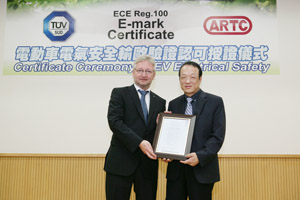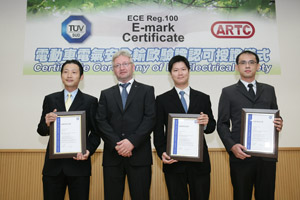Taiwan's ARTC Becomes 1st TUV SUD-certified Overseas EV Facility
Local engineers sent to Germany for training in EV certification
2013/02/08 | By Quincy Liang
As part of its effort to develop Taiwan into an international base for the supply of high-quality, -safety, and -performance EVs and key systems, the government-backed Automotive Research & Testing Center (ARTC), the island's largest automotive research institute, recently announced that it had passed all the certification procedures of TUV SUD of Germany and had won the E/e Mark certificate for EV electrical safety.
This certification enables ARTC to provide related certification services to companies in Taiwan and the Greater China region that want to tap into the EV market in Europe.

Volker Blandow, chief of TUV SUD's global EV certification unit, presented an ECE R100 certificate to ARTC at an EV electrical safety certification technical seminar held in Taipei in mid-September.
To keep upgrading its ability to provide EV-related testing, inspection, and certification services, ARTC has been purchasing and installing advanced equipment of various kinds. The center has also signed a memorandum of understanding (MOU) on cooperation with TUV SUD for personnel exchange, with the aim of increasing its know-how and experience in related fields.
ARTC president Joy Huang pointed out that his organization has been maintaining a close partnership with TUV SUD in conventional vehicle certification. The new ECE R100 certificate, he stressed, indicates a higher level of cooperation between the two bodies, through which Taiwanese companies have access to immediate and comprehensive help in tapping the European EV market.
At the presentation of the certificate, Blandow said that TUV SUD has been aggressively developing "green industry"-related services because it recognizes that the whole world has to face severe challenges from greenhouse effects and crude-oil shortages. He praised the ARTC for its many talented professionals who have successfully set up the EV certification system in Taiwan.
In the past year, ARTC sent many engineers with expertise in EV electrical safety- and battery-related fields to TUV SUD to gain more professional know-how in certification processes. These Taiwanese engineers gained knowledge in the field through training with TUV SUD Automotive, TUV SUD Battery Testing, and the TUV SUD Academy.
ARTC's engineers have also completed stringent training courses in 20 categories such as EV high-voltage (HV) system operation, testing, and ECE R100 certification, and have passed all related examinations needed to win certification as "qualified electrician for HV system in motor vehicles." That means, ARTC said, that Taiwan now possesses the full capability to provide E/e Mark certification services to EV makers.
To build up a comprehensive EV certification environment, ARTC also invited TUV SUD's experts to evaluate its personnel, lab capability, quality system, and experience. When the center finally met TUV SUD's stringent requirements, it won the German body's first E/e Mark certificate ever bestowed overseas.
ARTC noted that all industrially advanced nations have been aggressively carrying out EV pilot programs in recent years, and that an increasing number of automakers have introduced road-feasible EV models or are planning to do so. ARTC promised that it would try as hard as possible to set up new standards, conduct intensive R&D work, construct a better environment for EV pilot projects, and constantly strengthen its testing and certificating capability so as to help local companies tap into the emerging industry and faster and more easily.
ARTC said that in Taiwan, ECE R100 standards to protect users from high-voltage injury and reduce the risk of gaseous bursts during the battery-charging will be applied to passenger and cargo EVs designed to run at over 25 kilometers per hour in 2014. Two years later, they are to be incorporated into traffic law. (Sept. 2012)




